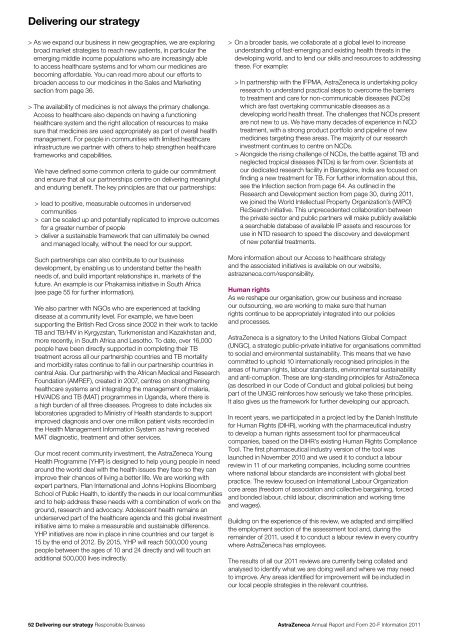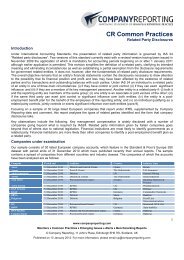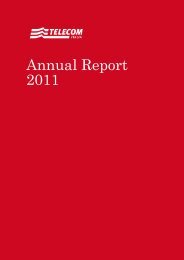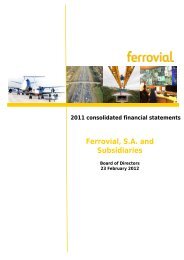AstraZeneca Annual Report and Form 20-F Information 2011
AstraZeneca Annual Report and Form 20-F Information 2011
AstraZeneca Annual Report and Form 20-F Information 2011
- No tags were found...
Create successful ePaper yourself
Turn your PDF publications into a flip-book with our unique Google optimized e-Paper software.
Delivering our strategy> As we exp<strong>and</strong> our business in new geographies, we are exploringbroad market strategies to reach new patients, in particular theemerging middle income populations who are increasingly ableto access healthcare systems <strong>and</strong> for whom our medicines arebecoming affordable. You can read more about our efforts tobroaden access to our medicines in the Sales <strong>and</strong> Marketingsection from page 36.> The availability of medicines is not always the primary challenge.Access to healthcare also depends on having a functioninghealthcare system <strong>and</strong> the right allocation of resources to makesure that medicines are used appropriately as part of overall healthmanagement. For people in communities with limited healthcareinfrastructure we partner with others to help strengthen healthcareframeworks <strong>and</strong> capabilities.We have defined some common criteria to guide our commitment<strong>and</strong> ensure that all our partnerships centre on delivering meaningful<strong>and</strong> enduring benefit. The key principles are that our partnerships:> lead to positive, measurable outcomes in underservedcommunities> can be scaled up <strong>and</strong> potentially replicated to improve outcomesfor a greater number of people> deliver a sustainable framework that can ultimately be owned<strong>and</strong> managed locally, without the need for our support.> On a broader basis, we collaborate at a global level to increaseunderst<strong>and</strong>ing of fast-emerging <strong>and</strong> existing health threats in thedeveloping world, <strong>and</strong> to lend our skills <strong>and</strong> resources to addressingthese. For example:> In partnership with the IFPMA, <strong>AstraZeneca</strong> is undertaking policyresearch to underst<strong>and</strong> practical steps to overcome the barriersto treatment <strong>and</strong> care for non-communicable diseases (NCDs)which are fast overtaking communicable diseases as adeveloping world health threat. The challenges that NCDs presentare not new to us. We have many decades of experience in NCDtreatment, with a strong product portfolio <strong>and</strong> pipeline of newmedicines targeting these areas. The majority of our researchinvestment continues to centre on NCDs.> Alongside the rising challenge of NCDs, the battle against TB <strong>and</strong>neglected tropical diseases (NTDs) is far from over. Scientists atour dedicated research facility in Bangalore, India are focused onfinding a new treatment for TB. For further information about this,see the Infection section from page 64. As outlined in theResearch <strong>and</strong> Development section from page 30, during <strong>20</strong>11,we joined the World Intellectual Property Organization’s (WIPO)Re:Search initiative. This unprecedented collaboration betweenthe private sector <strong>and</strong> public partners will make publicly availablea searchable database of available IP assets <strong>and</strong> resources foruse in NTD research to speed the discovery <strong>and</strong> developmentof new potential treatments.Such partnerships can also contribute to our businessdevelopment, by enabling us to underst<strong>and</strong> better the healthneeds of, <strong>and</strong> build important relationships in, markets of thefuture. An example is our Phakamisa initiative in South Africa(see page 55 for further information).We also partner with NGOs who are experienced at tacklingdisease at a community level. For example, we have beensupporting the British Red Cross since <strong>20</strong>02 in their work to tackleTB <strong>and</strong> TB/HIV in Kyrgyzstan, Turkmenistan <strong>and</strong> Kazakhstan <strong>and</strong>,more recently, in South Africa <strong>and</strong> Lesotho. To date, over 16,000people have been directly supported in completing their TBtreatment across all our partnership countries <strong>and</strong> TB mortality<strong>and</strong> morbidity rates continue to fall in our partnership countries incentral Asia. Our partnership with the African Medical <strong>and</strong> ResearchFoundation (AMREF), created in <strong>20</strong>07, centres on strengtheninghealthcare systems <strong>and</strong> integrating the management of malaria,HIV/AIDS <strong>and</strong> TB (MAT) programmes in Ug<strong>and</strong>a, where there isa high burden of all three diseases. Progress to date includes sixlaboratories upgraded to Ministry of Health st<strong>and</strong>ards to supportimproved diagnosis <strong>and</strong> over one million patient visits recorded inthe Health Management <strong>Information</strong> System as having receivedMAT diagnostic, treatment <strong>and</strong> other services.Our most recent community investment, the <strong>AstraZeneca</strong> YoungHealth Programme (YHP) is designed to help young people in needaround the world deal with the health issues they face so they canimprove their chances of living a better life. We are working withexpert partners, Plan International <strong>and</strong> Johns Hopkins BloombergSchool of Public Health, to identify the needs in our local communities<strong>and</strong> to help address these needs with a combination of work on theground, research <strong>and</strong> advocacy. Adolescent health remains anunderserved part of the healthcare agenda <strong>and</strong> this global investmentinitiative aims to make a measurable <strong>and</strong> sustainable difference.YHP initiatives are now in place in nine countries <strong>and</strong> our target is15 by the end of <strong>20</strong>12. By <strong>20</strong>15, YHP will reach 500,000 youngpeople between the ages of 10 <strong>and</strong> 24 directly <strong>and</strong> will touch anadditional 500,000 lives indirectly.More information about our Access to healthcare strategy<strong>and</strong> the associated initiatives is available on our website,astrazeneca.com/responsibility.Human rightsAs we reshape our organisation, grow our business <strong>and</strong> increaseour outsourcing, we are working to make sure that humanrights continue to be appropriately integrated into our policies<strong>and</strong> processes.<strong>AstraZeneca</strong> is a signatory to the United Nations Global Compact(UNGC), a strategic public-private initiative for organisations committedto social <strong>and</strong> environmental sustainability. This means that we havecommitted to uphold 10 internationally recognised principles in theareas of human rights, labour st<strong>and</strong>ards, environmental sustainability<strong>and</strong> anti-corruption. These are long-st<strong>and</strong>ing principles for <strong>AstraZeneca</strong>(as described in our Code of Conduct <strong>and</strong> global policies) but beingpart of the UNGC reinforces how seriously we take these principles.It also gives us the framework for further developing our approach.In recent years, we participated in a project led by the Danish Institutefor Human Rights (DIHR), working with the pharmaceutical industryto develop a human rights assessment tool for pharmaceuticalcompanies, based on the DIHR’s existing Human Rights ComplianceTool. The first pharmaceutical industry version of the tool waslaunched in November <strong>20</strong>10 <strong>and</strong> we used it to conduct a labourreview in 11 of our marketing companies, including some countrieswhere national labour st<strong>and</strong>ards are inconsistent with global bestpractice. The review focused on International Labour Organizationcore areas (freedom of association <strong>and</strong> collective bargaining, forced<strong>and</strong> bonded labour, child labour, discrimination <strong>and</strong> working time<strong>and</strong> wages).Building on the experience of this review, we adapted <strong>and</strong> simplifiedthe employment section of the assessment tool <strong>and</strong>, during theremainder of <strong>20</strong>11, used it to conduct a labour review in every countrywhere <strong>AstraZeneca</strong> has employees.The results of all our <strong>20</strong>11 reviews are currently being collated <strong>and</strong>analysed to identify what we are doing well <strong>and</strong> where we may needto improve. Any areas identified for improvement will be included inour local people strategies in the relevant countries.52 Delivering our strategy Responsible Business<strong>AstraZeneca</strong> <strong>Annual</strong> <strong>Report</strong> <strong>and</strong> <strong>Form</strong> <strong>20</strong>-F <strong>Information</strong> <strong>20</strong>11










